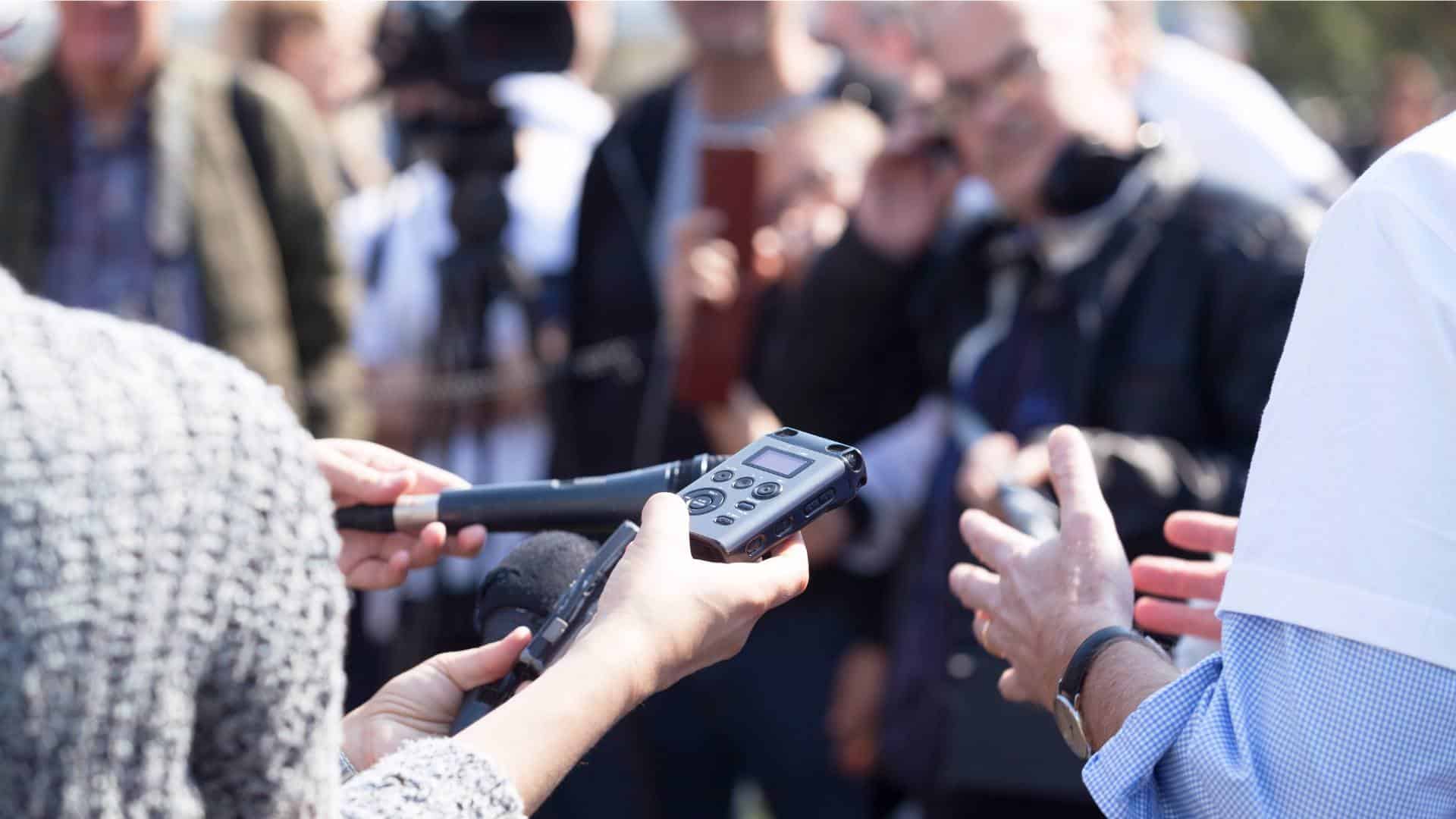A news story is only as good as the sources of information the reporter relied on. And figuring out where to find trustworthy information is a challenge.

A reporter records an interview. (Mihajlo Maricic/Getty Images)
Journalism and activism can be powerful tools for change. Each week in our News Decoder Top Tips, we share advice from reporters, editors, writers and master storytellers on ways to better engage audiences and spur change. In this Top Tip, Sabīne Bērziņa, News Decoder’s user experience manager for its Promoting Media Literacy & Youth Citizen Journalism through Mobile Stories project, explains the importance of finding credible, knowledgeable and diverse sources for news stories.
Top Tips are part of our open access learning resources. You can find more of our learning resources here. And learn how you can incorporate our resources and services into your classroom or educational program or by forming a News Decoder Club in your school.
When researching a news story there are many sources of information. But which ones can you trust? Your credibility — whether people will trust what you report — depends on the credibility of your sources.
In journalism, reporters learn new, valuable information and then share that information with the public. In that process, where they get their information is everything. If you choose the wrong sources, your article might end up untrue, irrelevant or not reflective of the experiences of your readers or the people it is supposed to be about.
“As a reporter, you’re only as good as your sources,” said Matt Drange, an investigative journalist at Business Insider, a financial news site based in California. “These days the internet makes finding and accessing information easy. But just because someone says something, doesn’t make it true or worthwhile for you to report in a journalistic article.”
Drange is a also a video instructor for Mobile Stories — an innovative journalism education and publishing platform used in schools. News Decoder leads the educational content development in English as a part of our mission to inspire young people to explore global issues through journalism.
Internet research is often the start to writing a well-sourced story, but it isn’t the end.
Start with basic information.
Once you have figured out what you want to report on, you need to understand what has been reported previously, what questions were left unanswered in those news stories and what new developments might be happening.
You might start with news stories or research studies or reports from government organizations or NGOs. Pay attention to the groups of people involved, the people who are most affected, the organizations studying the problem and the government agencies responsible for regulating it. These are people you might be able to interview. Also hone in on any research or statistical data relevant to the situation.
Take good notes. The context you need to understand the situation might help your readers to understand it, too.
The next step is to talk to people at the heart of the issue or problem. “You need to interview sources of information firsthand to understand the context for what they are saying,” Drange said.
You move the discussion forward when you find something new that has happened. People you’ve noticed while doing research who are actively engaged in the discussions can help you understand what has happened in the past and point you to what is happening now.
When you have identified someone you want to contact, learn more about that person. It will help you prepare interview questions and figure out if they are well-placed to answer your questions.
Identify the people who have information to share.
Choose sources who are knowledgeable on the topic you are writing about. Is their job related to the topic you are researching? Are they an eyewitness to an event you are describing? You can also ask them if they know of someone else you should talk to.
Drange added that it is important to know their motivation for talking. “To figure out how reliable a source is, you need to assess not only their credentials but also their interests,” he said. “Why are they telling you a piece of information?”
When he interviews people for stories, he wants to know their agenda. “Find out where the person most recently worked, what interests them and why you think they may be willing to speak with you,” he said. “Are they upset at a policy or action by an institution?”
For example, an ex-employee of an organization you write about might feel more comfortable revealing some unflattering information about its work, but they also might be disgruntled and looking to demean it because of a personal conflict.
Always consider if their attitude and past experiences could mean that they might not be fully honest with you, especially if they reveal something unexpected. Try to check the information you get from people against other sources of information.
“In addition to human sources, you also need to think about documents and data,” Drange said. “They provide another level of authority to your work.”
Diversify your information sources.
This can be research, statistics or information disclosed by governments. Is the information told to you or the conclusions you reach from it supported by data? Is the event you describe a one-off oddity or reflective of the experiences of many? Research results or statistics can help you figure that out.
Now, you might be thinking that it sounds like a lot of work. How many sources do you need to write a story? There is no set number.
Most importantly, you have to consider if you are describing the events in a balanced way and taking different perspectives into consideration. Think about whether there are some other groups of people affected and if you know how they feel about it.
Don’t forget to seek comments from the person or organization you write about, especially when you criticize them or accuse them of doing something wrong. A good rule of thumb is that if you need to mention a person or an organization in your article, it might be worth asking for their perspective too.
And you don’t have to quote everyone you talk to. Sometimes you might interview someone just so that you understand the issue enough to write about it.
“The more people you speak with, the better informed you’ll be to describe how the people you are writing about perceive an issue,” Drange said. “There is the accuracy upon which you’ll be judged. Did you get the facts correct? And then there is the more nuanced but equally important context which you are expected to provide to your audience.”
Three questions to consider:
- Why do you have to be careful not to rely on just one source of information for a news story?
- How can you know if someone you interview is telling you the truth?
- Why might you interview someone for a story that you won’t quote?

Sabīne Bērziņa is News Decoder’s user experience manager for its Promoting Media Literacy & Youth Citizen Journalism through Mobile Stories project. She is a media literacy curriculum and tool developer, as well as a journalist with nine years of experience in the media industry. She lives and works in Latvia.
